Michael Bay: Midas Touch of Destruction

One of last year’s major box-office hits, “Armageddon”, just hit video stores a few weeks ago on VHS and DVD. Within days, “Armageddon” turned out to be one of the fastest selling DVDs in the 18-month history of the format. It seems, the story of a motley crew of oil-drillers making their way into space to save the world from an impending asteroid impact, hit a string with audiences worldwide. Only weeks after its original release through Buena Vista Home Video, Criterion Collection announced a full blown 2-disc Special Edition of this film with hours of supplements for release on DVD later this year.
What do films like “Armageddon”, “The Rock” and “Bad Boys” have in common? They are all fast-paced action films, yes, but they are also directed by the young, talented Michael Bay, who set out to conquer Hollywood after spending years shooting highly acclaimed TV commercials. It took Michael Bay only three films in Hollywood to establish himself as one of the hottest new action directors in Tinseltown.
“It is really cool to have created a movie that has turned out to become the biggest movie of the year,” Bay remarks about his latest film, “Armageddon”. For a man who is responisble for some of the most devastating global destruction on the silver screen, Michael Bay is surprisingly soft-spoken and charming. “It is clearly the film I am the most proud of. The writers, the team, the cast, all the people involved were just fabulous and great to work with”. “Armageddon” marked Michael Bay’s third collaboration with producer Jerry Bruckheimer, who has become synonymous with fast’n’furious action spectacles. How does a young director shoot from zero to a colossal production like “Armageddon” in only three attempts?
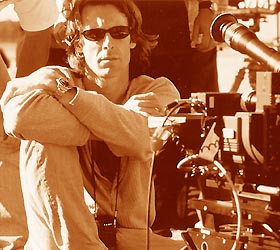 “It’s the box office success at the bottom line”, Bay replies, smiling. “I am lucky that I am tapping into something people want to see. It’s a lot of gut-instinct and not analytical at all. What happens is that I am trying to create films that I personally would love to see. It’s really hard to tell what makes my films so successful, but luckily they go around the world. They convert well into different cultures. In Japan, for example, ‘Armageddon’ was the fifth largest movie ever, and it works especially well there, because the cultural position of women in society in Japan requires daughters to ask their parents’ permission to see a man. The film’s content is appealing to those cultures as well as it is to us.” After a moment’s thought, Bay adds, “Maybe I have just a younger voice than many other directors.”
“It’s the box office success at the bottom line”, Bay replies, smiling. “I am lucky that I am tapping into something people want to see. It’s a lot of gut-instinct and not analytical at all. What happens is that I am trying to create films that I personally would love to see. It’s really hard to tell what makes my films so successful, but luckily they go around the world. They convert well into different cultures. In Japan, for example, ‘Armageddon’ was the fifth largest movie ever, and it works especially well there, because the cultural position of women in society in Japan requires daughters to ask their parents’ permission to see a man. The film’s content is appealing to those cultures as well as it is to us.” After a moment’s thought, Bay adds, “Maybe I have just a younger voice than many other directors.”
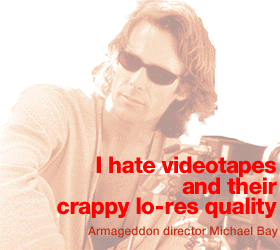 Younger voice or not, one thing is clear: Michael Bay’s career in Hollywood is very distinct from that of the ordinary director. His first film, “Bad Boys”, starring Will Smith was shot on a rather moderate budget of $23 million, bringing in a steady $100 million at the box office. His second outing, the highly acclaimed “The Rock”, starring Nicolas Cage, Sean Connery and Ed Harris, boasting a budget of $75 million, resulting in a solid $250 million box office turnover. Finally, “Armageddon”, shot on a $140 million budget, produced almost $500 million at the box office. Where is this trend taking us?
Younger voice or not, one thing is clear: Michael Bay’s career in Hollywood is very distinct from that of the ordinary director. His first film, “Bad Boys”, starring Will Smith was shot on a rather moderate budget of $23 million, bringing in a steady $100 million at the box office. His second outing, the highly acclaimed “The Rock”, starring Nicolas Cage, Sean Connery and Ed Harris, boasting a budget of $75 million, resulting in a solid $250 million box office turnover. Finally, “Armageddon”, shot on a $140 million budget, produced almost $500 million at the box office. Where is this trend taking us?
“I do not have a project at the moment and am on the lookout for something I like.” Michael Bay has scrapped plans to do a sequel to his first film “Bad Boys” he lets us know. “There’s just not a good script around and as a result the project is simply not going anywhere. I am not even sure if Columbia is still interested in it.” Bay remarks. ??“20th Century Fox called me up some time ago. They want me to do a new version of “Planet Of The Apes”. That’s a project I would really like to do. It’s a big challenge. I also plan to work on an epic African movie about paleontologist Dr. Richard Leaky, the great elephant savior and director of National Parks and Wildlife, but that’s still some time out.”
As we all vividly recall “Armageddon” collided with Paramount’s “Deep Impact” at the box office. It must be a filmmaker’s nightmare to work on a project and then learn that another film is in the making that covers the same premise, although from a different angle. “It didn’t really bother me, at least not as much as you might think.” Bay replies, slightly amused. “We really had the advantage. ‘Armageddon’ was the bigger movie. ‘Deep Impact’ wasn’t really a priority over at Paramount and they still tried to get the project going. When they heard about ‘Armageddon’, they quickly put ‘Deep Impact’ on the BIG fast track. I knew they had a different take on the issue and I knew we had the bigger movie, so I wasn’t really worried. I also believe in the Rule of Threes. Three movies make people in Hollywood and ‘Armageddon’ was my third project, so I was very confident. ‘Deep Impact’ took money away from us, sure, but there is this weird phenomenon about people and asteroids. Some time ago NBC had a show about asteroids and although the show wasn’t any good, it had the largest viewership of any show at that time. People are fascinated with asteroids, which eventually left enough room in the market for both films. ‘Deep Impact’ still turned out to be the 7th biggest film of the year.”
Michael Bay is a fast shooter when it comes to actually filming his movies. He is quite organized, and does a lot of storyboarding before the actual shoot. “Nonetheless I allow a lot of room for improvisation and funny stuff,” he confides. “I always feel planned out, prepared, and try to shoot the best, but in the heat of the action oftentimes you have make things up. Certain scenes you also can only pre-visualize on the set and with the help of the actors.”
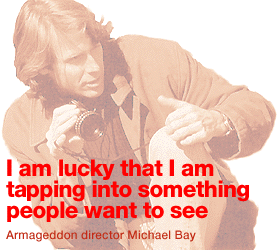 Continuity seems to be a constant struggle with Michael Bay’s films. If you give them a close look you will detect a number of continuity errors throughout his works. What may initially seem like negligence on his behalf turns out to be more of a calculated chaos. “I don’t get hung up on continuity too much”, Bay confesses. “I am a fast shooter so I shoot a lot of extra footage that allows me to work with it at the editing stage.” Many decisions are made in the editing room, the only place where you can make an action movie really work, and this is exactly where many of Bay’s continuity errors originate. He and his crew are often aware of the risks they take and the errors they introduce during the film’s shoot sometimes and actually make fun of it. “Sometimes, we just laugh about it knowing that this is a scene they will talk about in ‘Premiere’ magazine because of its flaws in continuity,” Bay continues. “I think you have to make movies for the general public and not the details,” he adds. “When you get hung up on continuity, you can’t keep the pace and price down. Most people simply consume a movie and they are not even aware of these errors. You and I, we talk about it, we are aware of it, and we joke about it, but the general public overlooks them most of the times because the intensity of the action on screen doesn’t allow them to keep track of all these details.”
Continuity seems to be a constant struggle with Michael Bay’s films. If you give them a close look you will detect a number of continuity errors throughout his works. What may initially seem like negligence on his behalf turns out to be more of a calculated chaos. “I don’t get hung up on continuity too much”, Bay confesses. “I am a fast shooter so I shoot a lot of extra footage that allows me to work with it at the editing stage.” Many decisions are made in the editing room, the only place where you can make an action movie really work, and this is exactly where many of Bay’s continuity errors originate. He and his crew are often aware of the risks they take and the errors they introduce during the film’s shoot sometimes and actually make fun of it. “Sometimes, we just laugh about it knowing that this is a scene they will talk about in ‘Premiere’ magazine because of its flaws in continuity,” Bay continues. “I think you have to make movies for the general public and not the details,” he adds. “When you get hung up on continuity, you can’t keep the pace and price down. Most people simply consume a movie and they are not even aware of these errors. You and I, we talk about it, we are aware of it, and we joke about it, but the general public overlooks them most of the times because the intensity of the action on screen doesn’t allow them to keep track of all these details.”
Many directors complain about the interference of studios with their work and the lack of creative control they can exercise over their work. “Working with [producer] Jerry Bruckheimer is just great”, an enthusiastic Bay explains. “You have pretty much all the control you can ask for. Jerry has Final Cut on his films, which practically means, I have the Final Cut, too. Jerry always makes suggestions and comments if he doesn’t like things, but he never forces you to make changes. He is simply trying to help and never says, ‘You have to cut this way or that way’. Jerry always supports you and says, ‘It’s your movie and you don’t have to do what I say!’”
After putting so much work, heart, and effort in to a film, it is often hard to see this work in a format different than the original theatrical version. Michael Bay is exercising a great deal of control over his work for the film’s theatrical run, but when it comes to video, certain issues are beyond even his control. While video and TV have vastly expanded the exposure and the profitability of films, they also introduced new, unwanted problems. Many films are butchered with cropped pan & scan versions and content-edited versions for TV, to the point that the plot sometimes doesn’t even make sense any longer.
Michael Bay has a rather relaxed view on these issues considering that he is one of the people creating these films. “I am coming from commercials so I know how to work with a 4:3 aspect ratio, and TV and video are great to reach a really wide audience, although at a price. Of course we want people to experience the films in a movie theater in the first place. That’s what movies are made for. I personally hate videotapes and their crappy lo-res quality. I love DVD and Laserdisc, however. Especially DVD is such an inexpensive format and uses much less shelf space than Laserdisc, which is very important, especially for video stores. In the long run video stores will be instrumental in the craze about DVD. They will drive the format.”
Of course, Michael Bay hates it every time he sees a mutilated film on TV, intersected with an endless array of commercial breaks. “I hate to see my films like that, but I also understand that many people just don’t care. They appreciate great sound and visuals, but they don’t really care about the filmmaking details.” Bay is fully aware that the majority of people simply consume the product and if it’s coming in a pan & scan version, that’s how they take it. “Video is an outlet to make a lot of money for the studios”, he says, and agrees that the growth of home video is in part responsible for growth of the budgets we have seen in motion pictures over the past years. The studios have substantial additional income on video sales, which reduces the risks in recouping their investments. “Most of the money from video sales doesn’t go into anyone’s pocket”, he adds. “Sure, we get a really small royalty on every unit sold, but the majority of the money goes to the studios. Which is fair, because after all they took all the risk to produce the film in the first place.”
Home video equipment is becoming both more sophisticated and affordable, and ever since the introduction of DVD, high-end video quality is within reach for everyone. Is there a fear among filmmakers that DVD or any other high-end video format of the future might eventually cannibalize the box-office and keep people out of movie theaters?
Bay is adamant about that. “I don’t think so. People just like to go out and watch movies with other people. It’s not much fun to see a comedy and don’t hear other people laughing. It’s infectious and enhances the experience. Going to the movies is an event and that makes movie theaters unique.” Some home theaters are so sophisticated today that many people even claim the image and audio quality is better than what they get at their local movie theater. “That’s a serious problem”, Bay agrees. “James Cameron has touched upon that point as well. The quality of movie theaters is sometimes a real problem. In order to remain attractive and stay in business, many theaters need to upgrade their systems to A+-quality levels, so that people come out of the house. They need to make sure the quality people experience at the theater is something they could never achieve within their own walls.”
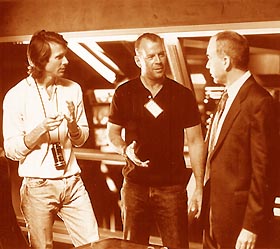 Michael Bay was strongly involved in the conversion of his films to video formats. “I am very picky about the quality of my films. I overlooked the complete release and transfer of the films to video. I was there every step of the way and now, the guys at Disney probably hate me”, he recollects. “At one point they came in and asked me, ‘What are you doing in the transfer room?’ and I just replied, ‘Do you really think I like to spend my whole summer in a dark transfer room?’” Obviously they felt as if the young director was trying to make their lives intentionally miserable, which was clearly not the case. “I am just very careful and want to make sure everything is of the best possible quality. Many directors don’t know that video is a totally different beast. Certain things that work on film just don’t look the same on video and you have to adjust them. I care a lot for my films and watch certain things like colors and contrast very closely. It took us forever to get the image in ‘Armageddon’ right, for example, until finally we settled for a low current print as previously used in David Fincher’s “Se7en” to achieve the strong contrast and really solid blacks [for the film’s theatrical and video release. (The Editor)].”
Michael Bay was strongly involved in the conversion of his films to video formats. “I am very picky about the quality of my films. I overlooked the complete release and transfer of the films to video. I was there every step of the way and now, the guys at Disney probably hate me”, he recollects. “At one point they came in and asked me, ‘What are you doing in the transfer room?’ and I just replied, ‘Do you really think I like to spend my whole summer in a dark transfer room?’” Obviously they felt as if the young director was trying to make their lives intentionally miserable, which was clearly not the case. “I am just very careful and want to make sure everything is of the best possible quality. Many directors don’t know that video is a totally different beast. Certain things that work on film just don’t look the same on video and you have to adjust them. I care a lot for my films and watch certain things like colors and contrast very closely. It took us forever to get the image in ‘Armageddon’ right, for example, until finally we settled for a low current print as previously used in David Fincher’s “Se7en” to achieve the strong contrast and really solid blacks [for the film’s theatrical and video release. (The Editor)].”
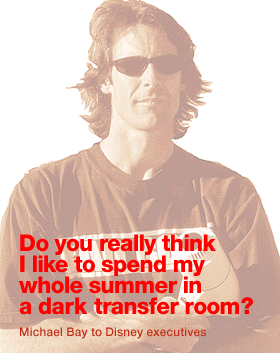 With that in mind, of course the next question is imminent. What does Michael Bay think about the fact that neither Buena Vista nor Criterion are using DVD’s anamorphic capabilities to pay tribute to the medium’s superior quality? “I didn’t really think about that”, he replies, completely surprised. “I always thought they were using the highest quality possible.” After telling him about people’s complaints that some studios simply ignore DVD’s increased definition capabilities he is quick to add, “I will definitely ask [Disney and Criterion] to stay state of the art.”??Bay was especially surprised to hear that Criterion have lost much of their reputation in the DVD ranks due to the fact that they ignore people’s comments and do not utilize DVD’s capabilities to its maximum. “I love Criterion for what they did. The Laserdiscs they produce are just fabulous. They have redefined the term home video. I wonder what’s happening with their DVDs. I know they had some problems with a telecine guy at Sony putting out shoddy transfers, but I think that problem is solved.”
With that in mind, of course the next question is imminent. What does Michael Bay think about the fact that neither Buena Vista nor Criterion are using DVD’s anamorphic capabilities to pay tribute to the medium’s superior quality? “I didn’t really think about that”, he replies, completely surprised. “I always thought they were using the highest quality possible.” After telling him about people’s complaints that some studios simply ignore DVD’s increased definition capabilities he is quick to add, “I will definitely ask [Disney and Criterion] to stay state of the art.”??Bay was especially surprised to hear that Criterion have lost much of their reputation in the DVD ranks due to the fact that they ignore people’s comments and do not utilize DVD’s capabilities to its maximum. “I love Criterion for what they did. The Laserdiscs they produce are just fabulous. They have redefined the term home video. I wonder what’s happening with their DVDs. I know they had some problems with a telecine guy at Sony putting out shoddy transfers, but I think that problem is solved.”
To a small degree Bay is even taking Special Editions into consideration when shooting his films. “The Criterion version of ‘Armageddon’ will contain about 5 minutes of extra footage. I usually shoot more funny and comic scenes than I will use, especially when we’re ahead of schedule. When you shoot a film you don’t always know what works or not, but either way, you can always use it for a Special Edition of the film,” he concludes. Michael Bay, a long time Laserdisc collector and DVD fan, clearly shows that he is a strong supporter of home video formats. His films are perfect showcases for the capabilities of DVD with their stunning use of color, the fast paced editing style and the bombastic sounds supporting the images. No matter what it will be, we are looking forward to Michael Bay’s next film.

Leave a comment
You must be logged in to post a comment.